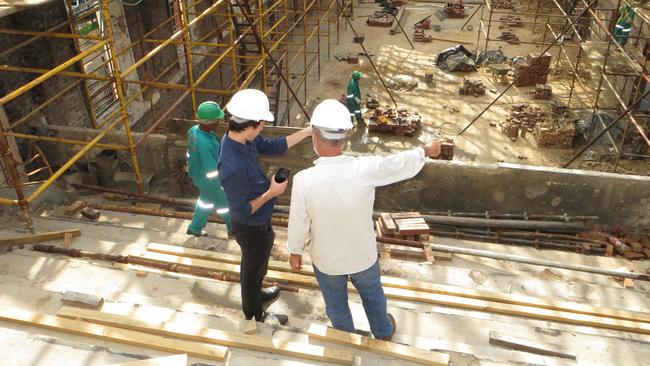QBCC ordered to pay $130k court costs after “wrong and unreasonable” suspension of family company’s builder licence
Queensland’s building regulator has been slammed for “wrong and unreasonable” conduct and ordered to pay court costs over its incorrect suspension of a company’s builder licence.

Business
Don't miss out on the headlines from Business. Followed categories will be added to My News.
QUEENSLAND’S building regulator has been ordered to pay more than $130,000 in court costs to a family company whose licence it wrongly suspended after “ignoring the plain wording” of its own policy.
Directors of the company, which cannot be named for legal reasons, had to personally guarantee its debts, with one forced to sell his home and move in with his in-laws to help fund the years-long litigation.
As well as directly supporting two families, the business employed more than 20 people, whose jobs were up in the air while the licence was in jeopardy.
After more than two years of battling, the company won on appeal this week, with the Queensland Building and Construction Commission eventually conceding every argument.

Court documents reveal the QBCC suspended the business’s carpentry licence under its minimum financial requirements policy on January 8, 2019, claiming it did not hold enough assets to meet its liabilities.
The policy sought to protect the industry from financial failure by ensuring businesses are capable of paying their debts. It was updated in 2019 to provide further clarity.
The documents say the QBCC refused to treat almost $360,000 of internal loans to directors as assets, disregarding advice from an independent accountant that the loans were collectable.
Under the QBCC’s policy, collectable internal loans could be considered current assets.
An affidavit from accountant Anthony Diacos revealed the exasperation of his repeated attempts to explain the QBCC’s policies to the QBCC.
“I have covered this issue exhaustively in my previous affidavits and communications with the (QBCC),” he wrote.
“I have explained this time and time again and provided them with actual definitions within their own policy documentation.
“There is no doubt in my mind from my over 20 years experience as an accountant that the related loans are collectable.”
FULL DIGITAL ACCESS: JUST $1 FOR FIRST 28 DAYS
The company applied for a review of the suspension and the Queensland Civil and Administrative Tribunal granted a stay on the licence suspension on February 7.
QCAT ordered the QBCC to outline its grounds for deciding the company did not meet financial requirements – an outline it didn’t produce until May 16.
But after a hearing, QCAT member Ann Fitzpatrick decided in favour of the QBCC, confirming the regulator’s reasons for suspending the licence.
The builder appealed the QCAT decision and another stay of the suspension was granted in August 2019, despite the QBCC refusing to consent to it.
By November, the QBCC had engaged an external barrister and it offered to reverse its initial decision – an offer the court refused and builder rejected as a “transparent device” to avoid conceding the appeal and risking an order for court costs.
The QBCC was given a March 31, 2020, deadline to file a notice outlining its position on the case, but took until June 2020 to do so, finally conceding all of the builder’s nine grounds of appeal.
The regulator’s filing accepted the first QCAT decision was made in error due to its incorrect submissions and agreed it should be set aside.

Although parties in QCAT proceedings usually bear their own costs, appeal tribunal members Michelle Howard and Samantha Traves considered whether the QBCC’s pursuit of the case was unreasonable, deciding it was “in the interests of justice” that it be ordered to contribute to the builder’s costs for the first tribunal case, the stay proceedings and the appeal.
The appeal decision said the regulator had ignored the plain wording in its own policy “without a sound legal basis” and accepted the builder’s submission it had no choice but to employ costly legal measures “to prosecute its rightful claim to relief against the unreasonable and wrong conduct of the QBCC”.
The tribunal members took into account the health impacts and “heavy personal toll” the matter had on a director.
The regulator was ordered to pay a total of $134,475 towards the builder’s costs of fighting the suspension, which court documents said were more than $200,000.
The tribunal also ordered the three directors be released from personal undertakings they had to make during the process and that the QBCC remove all reference to the incorrect licence decision from its register. The company’s lawyer Mitchell Hall declined to comment on the case.
A statement from the QBCC said the MFR policy had changed since the initial decision to provide greater clarity on financial issues in the industry.
“The QBCC’s Minimum Financial Requirements require licensees to have sufficient working capital for their turnover,” the statement said.
“We are focussed on the financial sustainability of the building and construction industry, and as a result of this, in the 2019-20 financial year, our work helped see more than $1.2 billion worth of working capital injected into major Queensland construction companies.”


